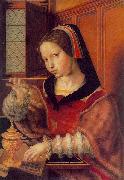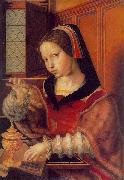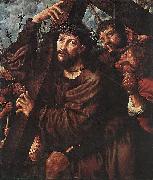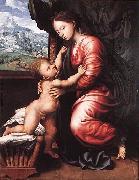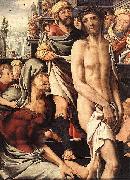Jan van Hemessen Huiler la Reproduction de TableauAll Jan van Hemessen Oil Paintings(c. 1500 - c. 1566) was a Flemish Northern Renaissance painter. He was born in Hemiksem, then called Hemessen or Heymissen. Following studies in Italy, in 1524 he settled in Antwerp. A mannerist, his images focused on human failings such as greed and vanity. Like his daughter, Catarina van Hemessen,he specialised in painted portraits. Jan Sanders van Hemessen was a Flemish Northern Renaissance painter who was part of the mannerist movement. He was born in Hemessen in the Netherlands but settled in Antwerp in 1524 after studying in Italy. Hemessen specialized in scenes of human character flaws such as vanity and greed. His pictures are often religious, while his style helped found the Flemish traditions of genre painting. Hemessen was also a portrait painter, which influenced his daughter to become a Flemish Northern Renaissance painter as well. The Surgeon of 1555 is an oil painting by Jan Sanders Van Hemessen currently in the Museo del Prado in Madrid, Spain. The scene likely represents a stonecutter at a fair. The surgeon, who is clearly happy that his operations have been successful, painstakingly moves his knife towards the stone, which is already visible. Behind him hang stones which have been successfully cut out of the head of other patients as a sign of his skill. Next to the quack stands a man who is wringing his hands in desperation, clearly going to be the next patient under the scalpel. |
|||

|
|||
|
|
|||
|
||||||||||||
| Jan van Hemessen (c. 1500 - c. 1566) was a Flemish Northern Renaissance painter. He was born in Hemiksem, then called Hemessen or Heymissen. Following studies in Italy, in 1524 he settled in Antwerp. A mannerist, his images focused on human failings such as greed and vanity. Like his daughter, Catarina van Hemessen,he specialised in painted portraits. Jan Sanders van Hemessen was a Flemish Northern Renaissance painter who was part of the mannerist movement. He was born in Hemessen in the Netherlands but settled in Antwerp in 1524 after studying in Italy. Hemessen specialized in scenes of human character flaws such as vanity and greed. His pictures are often religious, while his style helped found the Flemish traditions of genre painting. Hemessen was also a portrait painter, which influenced his daughter to become a Flemish Northern Renaissance painter as well. The Surgeon of 1555 is an oil painting by Jan Sanders Van Hemessen currently in the Museo del Prado in Madrid, Spain. The scene likely represents a stonecutter at a fair. The surgeon, who is clearly happy that his operations have been successful, painstakingly moves his knife towards the stone, which is already visible. Behind him hang stones which have been successfully cut out of the head of other patients as a sign of his skill. Next to the quack stands a man who is wringing his hands in desperation, clearly going to be the next patient under the scalpel. |
||||||||||||
|
|
||||||||||||
| ID de tableau:: 75222 Woman Weighing Gold, also called Woman Holding a Balance Woman Weighing Gold, also called Woman Holding a Balance Oil on oak-wood 44 X 31 cm (17.3 X 12.2 in) cjr Oil on oak-wood 44 X 31 cm (17.3 X 12.2 in) cjr |
||||||||||||
|
|
||||||||||||
| ID de tableau:: 77047 Woman Weighing Gold Woman Weighing Gold Oil on oak-wood Dimensions 44 x 31 cm (17.3 x 12.2 in) cyf Oil on oak-wood Dimensions 44 x 31 cm (17.3 x 12.2 in) cyf |
||||||||||||
|
|
||||||||||||
| ID de tableau:: 83092 Christ Carrying the Cross Christ Carrying the Cross Date 1553(1553) Medium Oil on wood Dimensions Height: 111 cm (43.7 in). Width: 97.5 cm (38.4 in). cjr Date 1553(1553) Medium Oil on wood Dimensions Height: 111 cm (43.7 in). Width: 97.5 cm (38.4 in). cjr |
||||||||||||
|
|
||||||||||||
| ID de tableau:: 83814 Virgin and Child Virgin and Child Date first half of 16th century Medium Oil on oak panel Dimensions Height: 150 cm (59.1 in). Width: 116.5 cm (45.9 in). cjr Date first half of 16th century Medium Oil on oak panel Dimensions Height: 150 cm (59.1 in). Width: 116.5 cm (45.9 in). cjr |
||||||||||||
|
|
||||||||||||
| ID de tableau:: 83960 Christ Mocked Christ Mocked Date ca. 1560(1560) Medium Oil on wood cjr Date ca. 1560(1560) Medium Oil on wood cjr |
||||||||||||
|
|
||||||||||||
| Artiste précédent Artiste prochain | ||||||||||||
|
|
||||||||||||
|
Jan van Hemessen (c. 1500 - c. 1566) was a Flemish Northern Renaissance painter. He was born in Hemiksem, then called Hemessen or Heymissen. Following studies in Italy, in 1524 he settled in Antwerp. A mannerist, his images focused on human failings such as greed and vanity. Like his daughter, Catarina van Hemessen,he specialised in painted portraits. Jan Sanders van Hemessen was a Flemish Northern Renaissance painter who was part of the mannerist movement. He was born in Hemessen in the Netherlands but settled in Antwerp in 1524 after studying in Italy. Hemessen specialized in scenes of human character flaws such as vanity and greed. His pictures are often religious, while his style helped found the Flemish traditions of genre painting. Hemessen was also a portrait painter, which influenced his daughter to become a Flemish Northern Renaissance painter as well. The Surgeon of 1555 is an oil painting by Jan Sanders Van Hemessen currently in the Museo del Prado in Madrid, Spain. The scene likely represents a stonecutter at a fair. The surgeon, who is clearly happy that his operations have been successful, painstakingly moves his knife towards the stone, which is already visible. Behind him hang stones which have been successfully cut out of the head of other patients as a sign of his skill. Next to the quack stands a man who is wringing his hands in desperation, clearly going to be the next patient under the scalpel. |
||||||||||||
|
|
||||||||||||
|
CONTACTER DES Etats-Unis |





